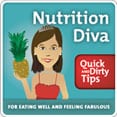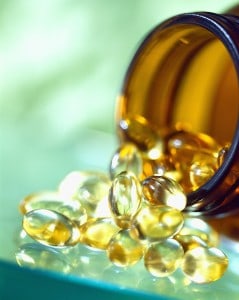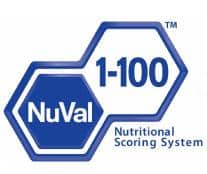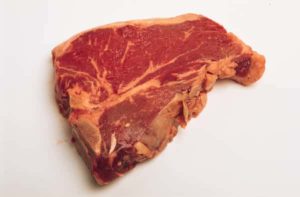 Think the debate over the national debt was contentious? That’s nothing compared to the war being waged in scientific circles about how much sodium it’s safe to eat. As researchers duke it out in the pages of medical journals, poor consumers are caught in a cross-fire of contradictory recommendations. In this week’s podcast, I tell you what you need to know to stay out of trouble. Read or listen to it here.
Think the debate over the national debt was contentious? That’s nothing compared to the war being waged in scientific circles about how much sodium it’s safe to eat. As researchers duke it out in the pages of medical journals, poor consumers are caught in a cross-fire of contradictory recommendations. In this week’s podcast, I tell you what you need to know to stay out of trouble. Read or listen to it here.
Category: Nutrition in the News
My take on the latest diet and nutrition headlines.
Do You Need to Cut Back on Salt?
Forget Salt. Focus on Potassium.
 That pain in your neck? Another case of nutrition whiplash, I’m afraid. Earlier this year, the USDA’s new Dietary Guidelines for Americans made the need to reduce sodium intake one of its primary messages.
That pain in your neck? Another case of nutrition whiplash, I’m afraid. Earlier this year, the USDA’s new Dietary Guidelines for Americans made the need to reduce sodium intake one of its primary messages.
Then, just last week, a new Cochrane Review concluded that “cutting down on the amount of salt has no clear benefits in terms of likelihood of dying or experiencing cardiovascular disease.” Continue reading “Forget Salt. Focus on Potassium.”
Fish Oil and Depression: Beyond the Headlines
 A recent study in the American Journal of Clinical Nutrition reports that a higher intake of omega-3 fatty acids from fish does not appear to reduce the risk for depression. It’s the latest disappointment in a slew of recent studies finding that fish oil failed to help prevent or slow Alzheimers, atherosclerosis, atrial fibrulation, or kidney disease.
A recent study in the American Journal of Clinical Nutrition reports that a higher intake of omega-3 fatty acids from fish does not appear to reduce the risk for depression. It’s the latest disappointment in a slew of recent studies finding that fish oil failed to help prevent or slow Alzheimers, atherosclerosis, atrial fibrulation, or kidney disease.
In a way, however, the part of this latest study that didn’t make the news is far more interesting than the headlines would suggest. Although a higher intake of fish oils did not ward off depression, a higher ratio of omega-3 to omega-6 in the diet did. Now that’s newsworthy.
In fact, it supports an argument I’ve been putting forth for some time: In order to get the benefits of omega-3 fats, we’d be better off cutting back on vegetable oils and other sources of omega-6 than popping fish oil capsules like bunch of deranged seals.
For a more detailed explanation of why this is the case (and how to go about it), please read or listen to my podcast: Fish Oils and Omega-3s.
Pros and Cons of Nutrition Scoring Systems
 Q. My local supermarket has added ‘NuVal’ nutrition scores to most of the labels in the store. How accurate do you think they are for judging the healthfulness of food? I can’t find details about how the NuVal score is calculated but sodium seems to be a factor. A low sodium version of the same product will score higher.
Q. My local supermarket has added ‘NuVal’ nutrition scores to most of the labels in the store. How accurate do you think they are for judging the healthfulness of food? I can’t find details about how the NuVal score is calculated but sodium seems to be a factor. A low sodium version of the same product will score higher.
A. NuVal is the commercial incarnation of the Overall Nutrition Quality Index or ONQI, a nutrition scoring system that’s been in development for several years. Foods are scored on a scale of 1 to 100, using a complex equation that takes into account a long list of vitamins, minerals, fiber, types of fat, protein quality, energy density, glycemic load, and so on. “Good” nutrients like antioxidants or omega-3 fats bring the score up; “bad” nutrients like cholesterol, sugar, and sodium bring the score down. The basic idea is to save shoppers time and simplify the task of selecting healthy (or at least healthier) foods. Continue reading “Pros and Cons of Nutrition Scoring Systems”
USDA Replaces Pyramid with Plate
No Tears for the Food Pyramid
 Thursday marks the unveiling of a new icon to replace the USDA’s much-maligned 20-year-old food pyramid. I’ve been getting media inquiries all week, asking about my thoughts on the move. I haven’t yet seen the new icon–it’s been kept under close wraps. (Last minute tweaking?) But from the rumors everyone has now heard, the new plate-shaped icon sounds like a step in the right direction.
Thursday marks the unveiling of a new icon to replace the USDA’s much-maligned 20-year-old food pyramid. I’ve been getting media inquiries all week, asking about my thoughts on the move. I haven’t yet seen the new icon–it’s been kept under close wraps. (Last minute tweaking?) But from the rumors everyone has now heard, the new plate-shaped icon sounds like a step in the right direction.
The food pyramid should have been retired long ago. It wasn’t clear, it wasn’t helpful, and, most importantly, it obviously hasn’t improved the nation’s eating habits. The 2005 revamp was even worse than the 1992 original on all counts. The new plate-shaped graphic sounds much more intuitive and easy to interpret. It answers the simple question, “What should my plate look like at any given meal?” Continue reading “No Tears for the Food Pyramid”
Red Meat and Colon Cancer: Beyond the Headlines
 I’m sure you saw the headlines this week about a new report from the American Institute for Cancer Research and the World Cancer Research Fund. The report covered a variety of factors that appear to increase risk of colorectal cancer, including alcohol, processed meat, and excess belly fat, as well as things that appear to decrease the risk, including exercise, garlic, milk (but not cheese), calcium, and foods containing fiber. However, most of the headlines I saw were along the lines of “It’s Official: Red Meat Causes Cancer.”
I’m sure you saw the headlines this week about a new report from the American Institute for Cancer Research and the World Cancer Research Fund. The report covered a variety of factors that appear to increase risk of colorectal cancer, including alcohol, processed meat, and excess belly fat, as well as things that appear to decrease the risk, including exercise, garlic, milk (but not cheese), calcium, and foods containing fiber. However, most of the headlines I saw were along the lines of “It’s Official: Red Meat Causes Cancer.”
As long-time followers know, I’ve long been suspicious of the science on “red” vs. “white” meat. See, for example: Red Meat: Not so Bad After All?
Having now read the latest report in its entirety, I want to highlight a few nuances that may help you decide how–or whether–to change your eating habits based on this latest indictment of red meat. Continue reading “Red Meat and Colon Cancer: Beyond the Headlines”
